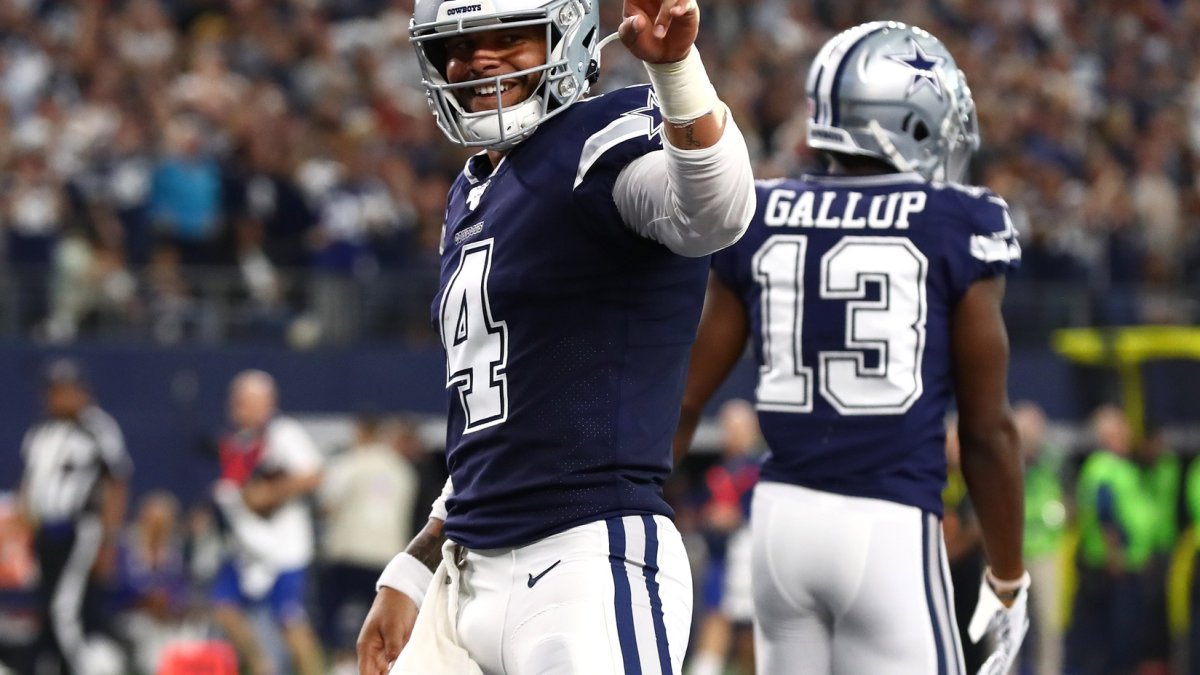Dallas made the move everybody expected on the eve of free agency and placed the franchise tag on quarterback Dak Prescott, preventing him from hitting the open market while the two sides work on a long-term extension.
Last season, Prescott showed that he can be as good as he was in his rookie year and that the level he had settled into before 2018 was as much a product of the underachieving team and scheme around him as it was his inherent ceiling as a player. He set career highs in passing yardage (4,901), touchdowns (30), and he did so despite leading the league in dropped passes from his intended receivers (43).
There is little doubt that he was hugely helped by the promotion of Kellen Moore to offensive coordinator and the changes that were brought to an offense that was very much lackluster in the seasons prior to Moore's appointment.
Moore ramped up the use of certain things that have become ways of “stealing free production” on offense. The Cowboys were sixth in terms of percentage of plays using pre-snap motion having been only 13th the season before, and the production these changes generated are a big part of the reason he was retained despite Mike McCarthy becoming the new head coach this offseason.
The big unknown when it comes to Dallas next season is what this melding of Moore and McCarthy will look like from a schematic point of view on offense. McCarthy took heavy criticism towards the end of his tenure in Green Bay for an offense that had grown stale and was no longer the irresistible force it had been when Aaron Rodgers was playing at his best, but there was always debate as to how much of this was down to the scheme itself and how much of it was Rodgers getting stuck in a rut of unhelpful playing habits, as well as the lack of receiving talent he had to throw to compared to those best teams.
That receiving talent will be critical in Dallas, as well. With Amari Cooper on the field, Dallas has been a completely different offense, regardless of the scheme they have been running. In terms of EPA per play, the team was almost 19 times better with Cooper than without him. Tagging Prescott gives the team a little breathing room to now throw all of their attention Cooper’s way and try and lock him down long-term to keep their best passing option intact.
For as much as Prescott’s resurgence in 2019 can be attributed to the offense changing, it also owes a lot to Cooper. In 2018, the season in which Cooper arrived via trade, Prescott’s numbers and play were dramatically different the second he arrived to give him a viable number one target. There is a wealth of evidence to point to the idea that there is nothing more important in maximizing Prescott’s ability than Cooper, so Dallas needs to prioritize signing Prescott's No. 1 receiver as well as just locking the signal-caller up for the 2020 season.
Dak Prescott: Passing stats with and without Amari Cooper (2017-2019, regular season only)
| Stat | 2017 – Week 8 of 2018 (Prior to Cooper's arrival) |
Week 9 of 2018 – 2019 (After Cooper's arrival) |
| Attempts | 696 | 916 |
| PFF passing grade | 73.1 | 75.0 |
| Yards per attempt | 6.8 | 8.0 |
| BTT% | 3.8% | 4.0% |
| Average depth of target | 8.8 | 8.9 |
| EPA per pass play | -0.048 | 0.153 |
The concern is that if they can’t do that, Prescott returns to the form that saw him post PFF grades of 72.2 and 74.8 before Cooper got there. That Dak Prescott ranked 23rd and 18th among quarterbacks in overall PFF grade, respectively, and would struggle to come close to justifying a contract that made him the best-paid player in football, should they work out that long-term extension. Even in terms of a one-year guaranteed sum on the franchise tag, that would seem like a stretch.
Dak Prescott may not be a transcendent talent at the quarterback position, and he's likely not a player capable of elevating the level of those around him. In a perfect world, those are the players that would get the giant contracts. But NFL economics doesn’t work quite like that, and the reality for the Cowboys is that they have very little alternative option, even if they have decided internally that Prescott isn’t worth a long-term monster-money contract. Their backup quarterback right now is Cooper Rush, who has shown well in limited preseason action but is far from a likely starting option, so they are in a spot where they have little other option than to tag Prescott and try to make the situation around him as beneficial as possible.
In essence, unless Dallas can work out a long-term deal for Prescott as well as Cooper before the season rolls around, they will be in the unenviable position of needing to support Prescott as much as they can with scheme and talent only so he can use that to demand more money in negotiations.
Such is the life of an NFL general manager.



 © 2024 PFF - all rights reserved.
© 2024 PFF - all rights reserved.